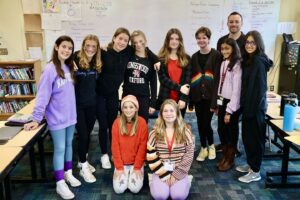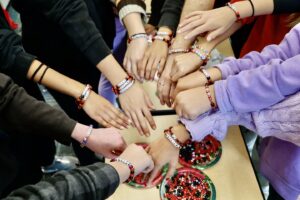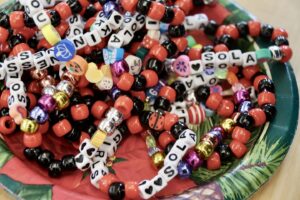October 23, 2023
Skills Incubator Building Hard and Soft Skills
A new initiative in the Middle School, The Skills Incubator, is an opportunity for students to learn for learning’s sake: to explore, to be curious, to fail, and to succeed. In the Sola micro-course, running in a 75-minute eight-class cycle, the class of 11 girls discovered Sola: The School of Leadership, Afghanistan, now in residence in Kigali, Rwanda, a boarding school that educates Afghan young women who are unable to learn in their own country due to the Taliban’s restrictions on female education.

According to the school’s website, the number of Afghan girls attending secondary school in 2021 was 1.1 million; now the number is zero since it is illegal for girls in Afghanistan to attend school after the sixth grade. Afghanistan is the only country in the world to bar half of its population from receiving an education.
Emphasizing authentic learning using future-focused skills: empathy, collaboration, research communication, creative problem-solving, reflection/innovation/iteration, tech, and media literacy, and engaged citizenship, the students reflect on how their education is different from the education of Afghan girls; research the lives of well known Afghan women who are global leaders (Shabana Basij-Rasikh, Pashtana Dorani, Fatima Amiri, Zahra Joya, Tamana Zaryab Paryani) and communicate with these women and the female students of Sola.

I
n a recent class, the students were writing letters of introduction, including photos of themselves, and making friendship bracelets in KO colors of red and black with hopeful expressions to send to Rwanda and form friendships. The hope is to build a connection with the Afghan girls and start a pen pal relationship. There’s also an upcoming book drive centered around the books they feel that every middle school girl should read.
The plight of the Afghan girls provided meaningful conversation among the classmates.
“They are smart girls who wanted to know more,” one KO student said.
“We take school for granted, and we don’t want to get out of bed,” another student said, “ but these girls are actually dying to go to school.”
“The reason the Taliban doesn’t want women educated is because the women would get stronger and that would threaten them,” one student shared.
Middle School teacher Beth Repp shared that since the students started learning about Sola, the Taliban instituted two more restrictive laws against women, one barring them from going to the salon and another from visiting parks.
“What’s the point of doing that?” a student asked. “I can understand that the Taliban doesn’t want women to be educated but it doesn’t make any sense that they can’t go to salons or parks.”
“It’s all about control,” Repp answered.
The students shared that they wanted to describe their lives to the Afghan students in their letters as well as ask them questions about the music they listen to. Although one student said she wanted to share her story of her family, she was sensitive not to talk too much about it so as to not sadden the Afghan girls.
“I want to talk about my family life in the letter but I don’t want to talk about it too much and make them feel bad,” she said. But I want to give them hope and have them think, ‘That could be me.’”
The students also discussed what items they would take with them if they were suddenly displaced from their homes. Ever practical, many of the students shared they would take their phones or money, but some added they would take family members, a notebook for writing, or a treasured stuffed animal.
Sola was founded by Shabana Basij-Rasikh. Both her parents were educators and understood the value of schooling. As a young girl, Shaban dressed as a boy to attend school and took a different route to school every day to avoid the ire of the Taliban. Many of the teachers who teach at Sola now are highly educated women who held top government positions before the Taliban regained control of the country. Eighty-five percent of the current sixth-grade girls at Sola are Afghan refugees who lived in refugee camps all over the world. The girls are able to speak with their families back in Afghanistan for one hour per day, but the families must be very discreet about their daughters’ education and not raise the suspicion of the Taliban for fear of imprisonment or worse.
Middle School teacher Matthew Wiggin who co-teaches the class with Beth Repp will travel to Sola in November with the KO student letters, beaded bracelets, and books. Wiggin’s trip is funded by the Jamie Garfield ’00 Grant Program, which was endowed by Diana Garfield in 2007. Each year since then, students and teachers have been invited to submit proposals for a project of special interest or importance to them. The focus of the proposed projects is to be a “hands-on” experience rather than a theoretical or academic pursuit. The recipient chosen is to embody Jamie’s candid wit, work ethic, and passion for travel and life.
